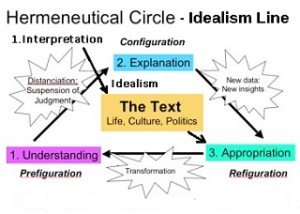
Hermeneutics and the end of idealism
It was Husserl who made the human sciences out of the Neo-Kantian slumber,  as described by Gadamer in speaking of what he called “hermeneutics of facticity”: “his analyzes of the” world of life “(Lebenswelt) and the anonymous constitution of all meaning and meaning Which form the soil and texture of experience, have definitively shown that the concept of objectivity represented by the sciences was only a particular case “(Gadamer, p.39).
as described by Gadamer in speaking of what he called “hermeneutics of facticity”: “his analyzes of the” world of life “(Lebenswelt) and the anonymous constitution of all meaning and meaning Which form the soil and texture of experience, have definitively shown that the concept of objectivity represented by the sciences was only a particular case “(Gadamer, p.39).
However Husserl was still attached to a subjective metaphysics of the phenomenon, such as Hegel would define as the Phenomenology of the Spirit, and then the old opposition between nature and spirit is reviewed, a fact almost unnoticed and emphasized by Gadamer: “the Human sciences and Nature must be understood from the intentionality of universal life “(ibid.).
Thus, with the resumption of the question of being, Husserl’s discoveries, when deepened by Heidegger, gave a sense of the most radical phenomenology: in realizing: that it is not necessary to separate, on the level of knowledge, the being of the nature of the historical being ” As Dilthey did … on the contrary, the mode of knowledge proper to the natural sciences is a kind of derivative of understanding, as Heidegger says in Sein und Zeit, ‘applies to the legitimate task of apprehending things [the Vorbandene, the entity ´Subsistent ‘] in its essential incomprehensibility “(Gadamer, pp. 39-40).
Heidegger’s knowledge assumes an ontological status, said in a seemingly complicated way, but is not, unlike [ideal knowledge]: “Understanding is the original form of realization of being-there human while being-in-the-world.” (Page 40).
Here the differentiation of practical interest and theoretical interest, understanding is the way of being-there that constitutes it as “know-being” (savoir-être) and “possibility” (idem).
Gadamer himself explains that for traditional hermeneutics, the Heideggerian theses seem provocative, because it explains, the verb Versteben (to understand in German) has two meanings: to understand the meaning of something, and to be understood in something.
While understanding (versteben) can mean that we understand something like going to the moon or the operation of an equipment, already the know-how, has the sense of ability, and this means to perform a practical task, only there being differentiation of theory and practice in the plane Of training rather than at the theoretical level. In the textual saying of Gadamer: “He [Heidegger] seems to be essentially distinguished from the understanding that one obtains in scientific knowledge” (page 41).
Although we are in the middle of the text, it can be said that it is a conclusion: “if they finally reduce to the common knot of a ‘I know how to occupy’ that is, an understanding of itself in relation to something” (p. 41), in italics in the original
Hans-Georg Gadamer, “The Problem of Historical Consciousness,” in “H.-G. Gadamer,” special issue, Graduate Faculty Philosophy Journal 5:1, 1975, page number is brazilian edition.









